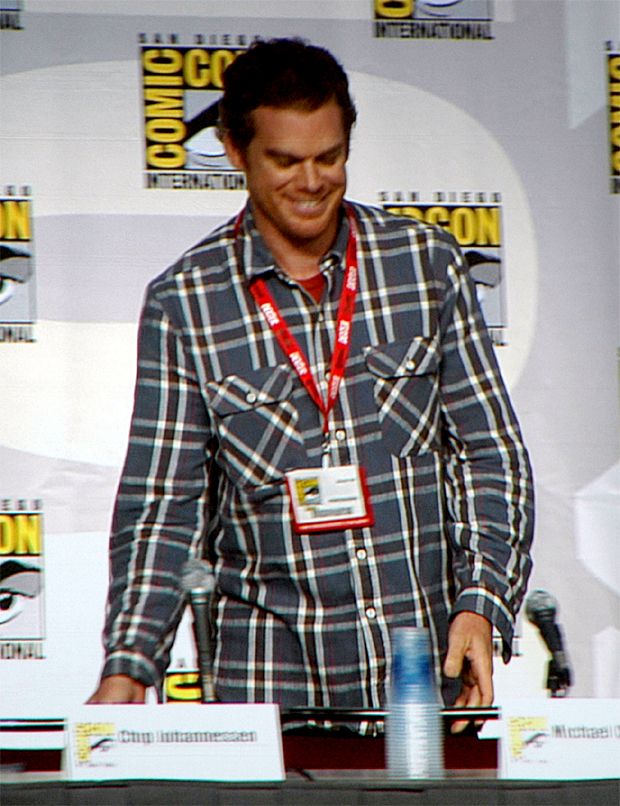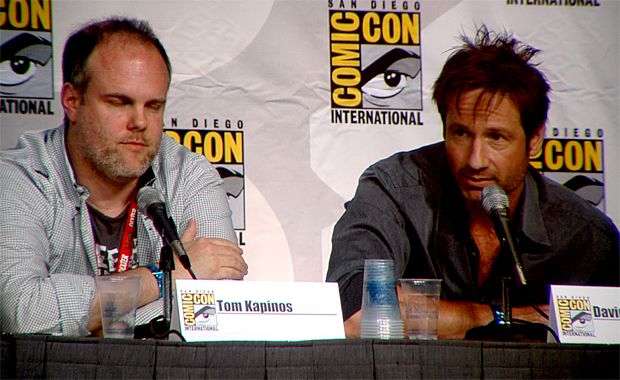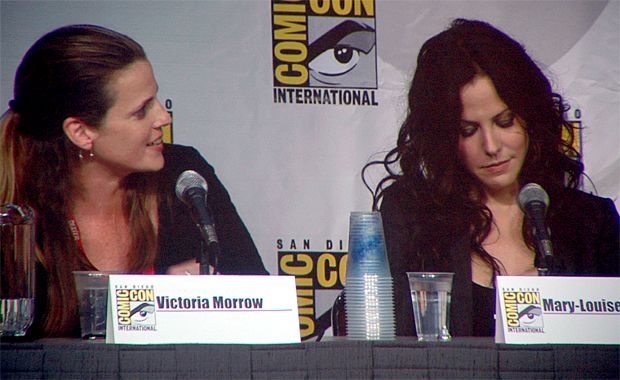| CBR's coverage of Comic-Con International 2010 is brought to you by Star Wars Celebration 5 and the following sponsors: | |||
|
| |||
Comic-Con International in San Diego was in for some dark and interesting times, as the "Anti-Heroes of Showtime" were presented to an enthusiastic audience.
Moderator Geoff Boucher, a writer for the Los Angeles Times, introduced the panelists: from "Californication," star David Duchovny and creator Tom Kapinos; from "Nurse Jackie," co-star Paul Schulze and co-creator Linda Wallem; from "Weeds," star Mary-Louise Parker and co-producer Victoria Morrow; and from "Dexter," star Michael C. Hall and executive producer Chip Johannessen. Introductions were followed by clips from all four shows.
The first show up for a question-and-answer session was "Californication." Asked how he keeps his character sympathetic, Duchovny said, "Early on we decided he is a truth-teller, and hopefully that would be sympathetic."
Kapinos added, "We're more worried about keeping him interesting."
Kapinos revealed that the new season will feature such guest stars as Carla Gugino, Rob Lowe as "an insane movie star," and Tommy Lee playing himself.
As for what has changed since the first season, Duchovny said, "It seems like Hank was originally the most wild character, and since then everyone else around him has gotten more chaotic, and now sometimes he is the voice of reason."
Shifting to "Nurse Jackie," Wallem was asked how it was to be working on the show. "The best part is when nurses come up to me and say the lines of the show to you," she said. "And first, I must say that this [being on the panel] is crazy freaky cool, to be sitting up here. … I'm freaking out a little. There was a question about the show, but I'm having a stroke, so I don't know."
Asked about the addiction aspect of the show, Wallem said, "It's just fun to see someone like Eddie Falco do that."
Switching to "Weeds," Parker was asked about her strong character, and about the baggage she's gathered over the episodes. "She's not a person who is burdened by guilt, or who feels sorry for herself a lot," Parker said. "She's someone who puts off, who procrastinates guilt. ... She will feel bad about that later, she'll take care of her child next week, do something special next month."
Morrow added, "We're about to send the characters fleeing down the road, so it's an opportunity to do a lot of different stuff, with new characters and new towns.
She also addressed some of the changes that have occurred over the course of five season. "We've seen Alexander [Gould], who plays Shane, go from being a very young boy clutching his mother, to a killer," Morrow said. "As we say, she home-schooled him, and he learned all the wrong lessons."
Finally, turning to "Dexter," Boucher asked Hall about his character's code. "The code seems to be such a foundation of the show," Boucher said. "Talk about what that has meant for you."
"It's initially a way to get to know the character," Hall replied. "He adheres to its tenants … he kills arguably horrible people, and that's a part of why we give him a pass for that. But after a certain point, what's interesting is to watch the ways that Dexter leans against the code, or even defies it. ... He defies it, and learns that he needs to return to it."
Johannessen added, "This is a character sort of born to this … he keeps trying to claw his way back, and establish attachments, even though that is the furthest thing from his start."
"How is it to play a character that was emotionless, and now emotions seem to be breaking out?" Boucher asked Hall. "How is it to deal with a character with that kind of range?"
"I don't think we were ever meant to take Dexter at his word [that he's emotionless]," the actor replied. "He's been thrust into situations that he never anticipated, but even in the beginning when Dexter claims to be without the capacity for real human emotion, I think we are skeptical ... and yet a fundamental disconnect remains. His ability to justify his behavior to himself is pretty incredible. He does maintain some sort of internal conception of things that allows him to kill people. Otherwise, I mean, would anyone watch it?"
"He's trying to reach out to humanity and it's really not gone very well," Johannessen added.
Having shown clips from all four Showtime series, Boucher turned to questions from the audience, starting with one for Duchovny: "Why did you choose to do 'Twin Peaks'?" (The actor, who's best known for playing an FBI agent in "The X-Files, first appeared as a transvestite DEA agent in the quirky David Lynch-Mark Frost drama.)
"That was a point in my career where I had no choice really," he responded. "It was a paycheck … and an interesting role. I think I was pulled in a week before the shoot when the previous actor dropped out."
To Hall: "Do you sympathize with what your character is doing?"
"My job is more to identify with what he is doing," he said. "Yeah, I think Dexter has a pretty formidable dark side, and I think he's taken at least some responsibility for what he is. Yeah, I sympathize with him."
To Morrow: "Does something have to change, or else are they [the 'Weeds' family], just going to go into a downward spiral even worse?"
"The family is constantly in a downward spiral and it is fighting against all sorts of forces trying to pull it apart, and that is the source of the drama really," Morrow answered.
To Duchovny: "Talk about the difference between Fox Mulder and your character on 'Californication'."
"I'd left Mulder behind," he said. "I never compare what I did in the past to what I do now. It's not really a conscious move that I make. It seems like another lifetime. I don't know how I would go about creating that character now, if I were to start to do Fox Mulder now."
To Hall: "What do you personally feel about your character's harsh method of dealing with social injustice?"
"It goes a long way to making the character interesting. If he just put up pictures of people and put a big X on their face, it wouldn't be as interesting," Hall said with a laugh.
To Morrow: "Does 'Weeds' have an endgame?"
"We do not have an endgame," Morrow answered with a big grin.
Hall and Duchovny were asked how it was to go from movies to television. Grinning, the two decided to answer in concert: "It's," said Hall; "Pretty much," said Duchovny; "The same," finished Hall, and they both laughed.
To Kapinos: "How did 'Californication' begin as a project?"
"'Californication' started as a screenplay, and it was a terrible screenplay," Kapinos said. "But my wife liked the first 60 pages, so we turned it into a spec script. I had a meeting with David, and I thought it went terrible. Later I got a note from him saying, 'Fuck you, it's been keeping me up at night'." Duchovny laughed.
Addressing the humor during serious moments on "Nurse Jackie," Wallem said, "We love having these really serious moments when someone just died, and Zoe comes in and says something really inappropriate. The humor is really important to cut the heaviness of the drama that these people [nurses] deal with every day."
Morrow was asked if any of the source material for "Weeds" comes from the border, near Mexico.
"Before the beginning of last season we took a trip, all of the writers and such, down to the border, kind of no-man's land," Morrow said. "And we saw a lot of grisly, weird stuff. So, yeah."
Hall was asked whether he was shocked by the season finale of "Dexter." "I was shocked, but I had some warning," he said. "I knew things were heading that way. ... I was happy we were able to keep it quiet from the audience. I was sad to not be able to work with Julie anymore … but for the story I was happy. The fundamental thing that Dexter used to view himself as normal is now gone."
Asked which of her nude scenes have been her favorite, Parker laughed and said, "Gosh, there are so many. It doesn't really faze me. I am undaunted by it. It doesn't make me feel terribly uncomfortable."
Asked what other show any of the cast members would want to be on, Parker said, "I wanted to be on 'Flight of the Conchords'."
"I'd love to be killed by Dexter," said Schulze.
Asked how emotional it was to film the season finale, Hall said, "It was actually Julia's last day, and the final scene had been very hush hush. We had read a false ending at the read-through. It was a very somber day, to ask Julie to get in that bathtub of bloody water. The emotion was kinda taken care of. I think Dexter, when we see him in that moment, it's a look of shock, and disbelief. ... More than anything, I think I just wanted to get that baby off that blood."





